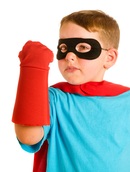Should nurseries ban superhero costumes and toy weapons?
20-Nov-16
Dr Sharon Lamb, professor of mental health at University of Massachusetts

Mini MoHo Nursery, Eastbourne
To view the results of the poll, you need to vote!
YES
Some nurseries have banned superhero costumes, toy swords and guns claiming ‘they encourage aggression and violence’.
This move seems to be backed up by research by Dr Sharon Lamb, professor of mental health at University of Massachusetts, who believes today’s superheroes are not good role models for children as they are violent and offer a “narrow vision of masculinity”.
She says: “Today’s superhero is too much like an action hero who participates in non-stop violence; he’s aggressive, sarcastic and rarely speaks to the virtue of doing good for humanity. When not in superhero costume, these men, like Ironman, exploit women, flaunt bling and convey their manhood with high-powered guns.
“The comic book heroes of the past did fight criminals, but these were heroes boys could look up to and learn from because outside of their costumes, they were real people with real problems and many vulnerabilities.”
“In today’s media, superheroes and slackers are the only two options boys have,” she adds. “Boys are told, if you can’t be a superhero, you can always be a slacker.
“Slackers are funny, but slackers are not what boys should strive to be; slackers don’t like school and they shirk responsibility. We wonder if the messages boys get about saving face through glorified slacking could be affecting their performance in school.”
NO
A nursery has warned that banning superhero costumes and toy weapons could have a ‘negative impact on children’s development, particularly boys’.
Mini MoHo Nursery in Eastbourne, has drawn up a policy explaining why it encourages weapon and superhero play, stating ‘historically, this type of play has often been banned from early years settings, in the belief that it encourages aggression or violence’.
However, Mini MoHo fears ‘this ban, as well as being difficult to enforce, may well have a negative impact on young children’s development, particularly boys’.
Its policy goes on to say ‘recent research and current writing suggests that children learn important lessons by exploring these themes in a safe arena of play, for example, concepts such as good and evil, life and death, strength and power, gender and identity.
The nursery says: ‘When superhero or weapon play is taking place a practitioner will be nearby to observe and extend this play. The practitioner may introduce other storylines or characters to develop this in a creative or imaginative way.’
The nursery’s stance is backed up by Naeema Jiwani, a child development psychologist at the Human Relations Institute, Dubai, who thinks superheroes play a vital role in childhood and says: “One of the biggest reasons kids love superheroes is the sense of control and power they can exert on the world vicariously. By channelling their energies into these fictional figures, they can conquer bad guys, rule the world and be kings or queens of their own universes.”
Latest Debate News
21-Sep-22 Should nurseries ditch words 'boys' and 'girls' and use inclusive pronouns like 'they', 'them' or 'theirs'?21-Mar-22 Should smacking children be banned in England?
20-Nov-16 Should nurseries ban superhero costumes and toy weapons?
30-Jun-16 Is controlled crying harmful for babies?
16-Jun-16 Should the Government reinstate Functional Skills as an alternative to GCSE English and maths for Level 3 nursery practitioners?